Posted by Deborah Huso on Dec 31, 2016 in
Musings,
Relationships,
Travel Archives 
Christmas 2012 at the so-called Magic Kingdom.
Desperation is a curious thing. It makes you act out of character, leap the bounds of reason, and throw yourself, sometimes, into downright painful situations—like Disney World at Christmas, for example.
I make no secret of my abhorrence of all things Disney, from its theme parks to its silly princess movies (though I give some exception to its more recent princesses of Frozen and Brave fame because the heroines had the chutzpah–thank God, finally–to rescue themselves instead of waiting for aid from men and mice).
In fact, I loathe Disney so much that when I watched Saving Mr. Banks, I was probably the only viewer of the film who wished P.L. Travers had NOT succumbed to the Disney spell and given the world Mary Poppins on the big screen.
But I digress…sort of….
Four years ago, I took my then five-year-old daughter to Orlando over the holiday for the sole purpose of escaping Christmas. Or rather, escaping the sadly “un-Rockwellian” and dysfunctional sort of Christmas that has become the norm in my familial experience.
Don’t get me wrong. I am no Mr. Scrooge.
Okay, maybe I am….
There was a time when I, like the young Scrooge, loved Christmas. I could not get enough of it. I wanted to go to every light show, ride around in the backseat of my parents’ car and watch gaudy, neon yard displays, and wrap gifts with the kind of gusto that inspired me to create custom bows for every package and plow through double-stick tape as if it was the elixir of the Gods.
That was when I was too young to fully appreciate the steely silences at grown-up dinner tables where half the adults didn’t speak to one another. That was before I understood that marriage and children did not constitute happily ever after, and also before I realized you don’t have to give misery your company.
But enlightenment comes to most of us eventually. And when it came to me, I started to find I didn’t like Christmas anymore. I didn’t like the guilt trips that accompanied it, the expectations, the busyness of it all, the obligations, the proximity to unhappy and disappointed relatives, the spending time with people I really didn’t want to spend time with….
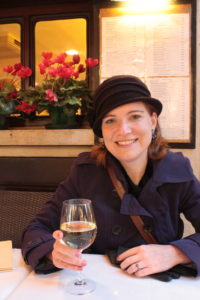
The best Thanksgiving ever…in Venice, Italy.
And so I went to Disney World, and, over the years and over many other family-oriented holidays, to many other places ranging from Venice to Budapest. And if I can’t find a way to get out of the state or the country for whatever pesky family holiday is trying to turn me bipolar, I will lock myself in my house with a bowl of homemade Swedish meatballs, binge-watch Netflix, and refuse to answer the phone.
In fact, I’ve made quite a habit of running away from Christmas, and Thanksgiving, and Easter, and Independence Day, and New Year’s…. You name the holiday, and I’ll tell you where I’ve gone to get away from it.
Because it’s pretty hard to feel “Christmassy” when it’s 80 degrees and you’re sitting poolside sipping a cocktail.
This most recent Christmas, I had dinner with people I’d met only days earlier, drank far too much wine, laughed till my sides ached, and happily forgot it was the 25th of December at all. And when polled, everyone at this table in Vienna, Austria, had similar stories–they were running away from home, too–from 20 years of cooking holiday dinners for ungrateful relatives, from houses empty of children or grandchildren, from piles of wrapping paper discarded from toys and gadgets forgotten within days….
Spending Christmas with these strangers was bliss, and it made me realize something–I have a problem, and, even worse, it’s not really one I want to eliminate.
I’m addicted to escapism. And not the kind of escapism that comes in a glass bottle and is topped off with a maraschino cherry.
I’m a literal escape addict.
And I don’t limit it to holidays. It’s even infiltrated my professional life. If there’s an assignment with an opportunity to get me out of Dodge, I’m always game, even if it means sitting on the ocean floor in a wetsuit with an electric eel circling me or sticking my camera lens up against the nose of a brown bear.
I realize there are those among my friends and acquaintances who just presume I love to travel, that I’m a classic Type T with a scary bit of A mixed in, and that I’m brave, lucky, a go-getter, and all that shit.
Maybe….
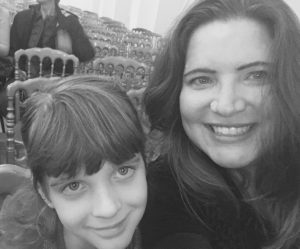
Christmas night with my daughter at an opera house in Vienna, Austria.
But I’m increasingly suspicious that all my running around the planet, hopping into kayaks and climbing Medieval towers is more about getting out of my life than into it.
It’s a coping strategy, not so terribly far removed from alcoholism, drug addiction, sex addiction, gambling…you name it.
Once I started to realize this, I wondered if maybe I shouldn’t just take up smoking or some similarly less expensive survival mechanism.
But then comes the self-justifying—all of you addicts out there know how this works, right?
Life is hard. (And believe me when I read those words on the first page of Scott Peck’s The Road Less Travelled, I almost didn’t want to read any more of it because I didn’t want to know that I already knew the answer—that life was hard and that I was just going to have to learn how to “keep on keeping on,” as my dad always says.)
I decided that if life was going to be hard and was going to keep throwing me curve balls, the least I could do was come up with a coping strategy (i.e. addiction) that might have some useful side effects.
Rather than suffer the hangovers and increasing tendency to do nothing that comes of addictions like sipping whiskey every night in front of the TV or endlessly trawling Facebook for some distraction from my personal reality, I thought perhaps an addiction to adventure, to travel might teach me a few things, that I might increase my knowledge, grow my curiosity, step up my courage…at the very least, become a more interesting person.
Because the only thing worse than an addict is a boring addict, right?
In the interest of continued self-justification, I’m going to say RIGHT.
Because there are a lot of ways to “keep on keeping on.” You can stop by that little country store every day after work and get a pack of cigarettes and six-pack of beer to stem your frustration and unwind from a reality that doesn’t fit that vision of life you maybe had long ago. That is indeed one way of coping, and it will likely get you through till your appointed end. As will chasing the jackpot, chasing women, chasing some pills with a shot of tequila….
But heck, wouldn’t you like to escape with a little more bang, a little more pizazz, a little more life?
I would…and I’m hoping that somewhere along this journey of running away to everywhere I may find an answer that will keep me home for Christmas one day. And if I don’t find that, I will at least find, I think, more understanding, more tolerance, and more reason to keep on keeping on….
Posted by Deborah Huso on Mar 22, 2016 in
Musings,
Success Guide,
Travel Archives “Life begins at the end of your comfort zone.” –Neale Donald Walsch

The weekend I learned archery AND how not to fall out of an ATV while driving sideways down a creekbed.
There was a time when piano recitals were one of the most dreaded things in my life.
I hated them, hated everything about them. First of all, preparation for them involved learning the most difficult composition of the year—some piece of classical music designed to show off all I had learned through 50-some weeks of lessons. And it was rarely a song I enjoyed playing…in no small part because I didn’t enjoy playing things that didn’t come easily.
Kind of the way I didn’t like Calculus. Or physics. Or football.
None of it came easily, you see.
And my parents, teachers, and coaches were so good at noticing all the things I did well that they really didn’t worry themselves about the areas where I struggled and then, usually, quit. Like piano. My mom said if I really hated piano lessons, I could stop when I turned 13, and I did.
In retrospect, it was one of a host of stupid decisions I made in my life out of laziness, boredom, self-consciousness, and an unwillingness to expose myself to the possibility of failure. Today I sit down at my piano and stare longingly at sheet music I wish I had the depth of skill to play.
Looking back, I can easily say I have lived more than half my life in fear.
Fear of how stupid I might look in trying something new.
Fear of being judged.
Fear of being ridiculed.
Fear of not being understood.
Fear of suffering.
Fear of being alone.
Fear of being abandoned.
Fear of not being smart enough, strong enough, good enough….
Fear of being KNOWN.
I couldn’t tell you when I finally snapped out of this. I don’t believe it happened in an instant. It was a process, a long and sometimes painful one.
I just know I was hiking one of the steepest trails I’d ever hiked (yes, this was before the Grand Canyon) with a friend and his son, the uber fit youngster looking like he was out for a Sunday stroll while outpacing us by several hundred yards. My friend turned to me and asked if I needed to rest.
“Nope,” I replied, though the sweat was pouring down my temples, “I’m good.”
And he grinned a little at me and said, “You know, you’re a really good sport. You’ll do just about anything, and you don’t complain about it either.”
I’m sure I looked at him a little sideways. I’d certainly never thought of myself as a good sport even though it’s one of those phrases parents bandy about, perhaps out of some obligation they feel to at least attempt to instill values of adventurousness, courage, and comfort with struggle or failure in their children.
But when I thought about it, my friend was right. Somewhere along the way, I had indeed become a good sport. And more than that, I’d gotten pretty fearless.
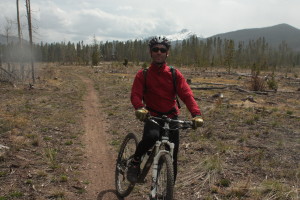
Mountain bike racer Jon Brickner: In all fairness to myself, do you see how tiny and wiry this guy is??
Sitting in a front row pew at church, anxiously waiting my turn to race through my dreaded recital piece on a clunky church piano as quickly as possible, I’m pretty sure I never dreamed in a million years I’d have the chutzpah to go mountain biking with one of the nation’s top racers (and yeah, it almost killed me) or to sit on the ocean floor, removing and replacing my dive mask at 60 ft. below the surface without launching into a full panic (and yes, I laid awake the entire previous night with anxiety about it).
I also never imagined I could love so deeply and be battered so wickedly and have the guts to go in for another round, and another. Or that I would be the kind of person who could pick up stakes and move every couple years, switch jobs every few months, and then finally throw up my hands and go out on my own without the slightest idea if I could really make it work. And I still haven’t proved if I can….
Somewhere along the way, I’d started trying to be like the famous Crazy Nastyass Honey Badger. I just did not give a shit.
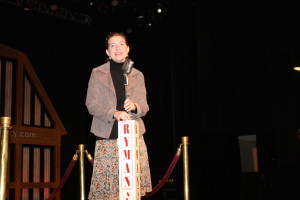
Heck yeah, I sang a few lines of “Crazy” at the Ryman!
I did not care if friends or relatives thought I had lost my mind. I did not care if it was dangerous to walk the streets of South American cities alone. I did not care if a piranha might eat my arm off. I did not care if I toppled off my standup paddleboard into the freezing Tennessee River. I did not care if anyone else was watching me dance or hearing me sing. I was learning to push my own envelope and in the process learning that it was outside my comfort zone that real life begins.
While you’ve undoubtedly watched the viral honey badger YouTube video and snorted laughter, how deeply have you considered the honey badger’s philosophy on life? Yeah, I’m being serious. Don’t forget that National Geographic has called the critter “the most fearless animal on the planet.” It will do, chase, eat anything.
And while it’s doing all this wild living, scavenging birds and foxes follow it around, too lazy (suggests the narrator) to go fight for their own meals, waiting to get the leftovers from this badass rodent. “The honey badger does all the work while the other animals just pick up the scraps,” notes the narrator.
I start thinking about these scraps. And people I know who survive on them. Getting by. Marking time. Watching life from a safe distance. Going in only when they’re absolutely certain the coast is clear.
And, of course, when you wait too long, curry safety over experience and security over destiny, scraps are what you will get.
If you ever thought “being a good sport” was about “settling,” reconsider. It’s really about getting out there, being willing to go for the biggest prize, and being able to feel good about yourself even when you don’t land it…because you know you tried, you know you lived, you know you pushed through fear.
What’s pushing through fear worth? Well, you certainly aren’t going to know until you’ve done it. But I will say the other side of fear is pretty euphoric…and worth giving a try.
A close girlfriend of mine once said to me, “You’re the bravest female friend I have who isn’t a lesbian.”
Well, she didn’t call me the “honey badger.” But close enough. I’ll take it.
Posted by Deborah Huso on Feb 28, 2016 in
Girlfriends,
Musings,
Travel Archives “Beauty is truth, truth beauty. That is all ye know on earth, and all ye need to know.”
–John Keats, “Ode on a Grecian Urn”
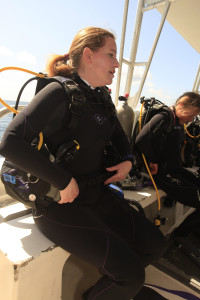
Who doesn’t look hot sporting an oxygen tank and a buoyancy control device?
They are among the most recognizable lines in English literature—taught in every twelfth grade English class, recited with little cognizance by millions of students, and something of a mystery even to scholars. Just what did John Keats mean?
And lest you think this blog has devolved into the realm of the esoteric, let me remark that it was just days ago I started to really get these lines supposedly spoken by Keats’ Grecian urn: “Beauty is truth, truth beauty.”
It hit me when I was gazing at the cover of Sports Illustrated’s latest swimsuit issue with so-called “plus size” model Ashley Graham crawling toward the camera in an alluring pose on the beach. When Cheryl Tiegs tweeted that Graham was a poor role model because of her weight, public outrage (at Tiegs) was instantaneous.
As it should have been.
Because beauty isn’t just in the eye of the beholder; it’s also a lot deeper and more complicated than a dress size…or even a pretty face. Like truth, it’s multi-faceted, complex, open to interpretation, and rarely absolute. And it’s also way more than skin deep.
But I can say all these things until I’m blue in the face, and it won’t keep the vast majority of American women (and girls, too) from looking at themselves in the mirror and launching into a litany of self- criticism:
My nose is too big.
My breasts are too small.
My hips are too wide.
My feet are too big.
I’m too short.
I’m too tall.
I look fat.
I hate my muffin top.
Ugh, look at that back fat.
I need to go on a diet.
And on and on it goes. I’ll admit it. I’ve done it, too. After all, in the 40 years I’ve been alive, the ideal woman, physically speaking, has been tall and waif-like (except for the breasts—the breasts remain Barbie-doll size; and I’m talking Barbie from the 1980s, not the C-cup version of modern times). In short, she has been, well, freakish.
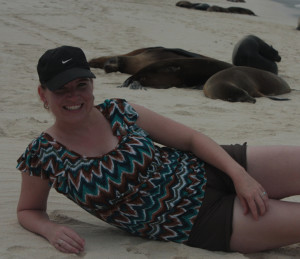
Now here’s my idea of a cover shot; the chunky gals in the back are Galapagos sea lions….
But I have, like most other women, nevertheless longed, at times, to exist a little closer to that ideal, even though I was, fortunately, raised by parents who never put a lot of stock in popular notions of beauty. In fact, I don’t think they could have cared less what I looked like. I was raised to place value in intelligence, hard work, good character, and, thanks to my dreamer father, risk-taking and adventure-seeking.
This is not to say I have been immune to the desire to look tantalizingly beautiful. Heck, I admit it, I put on mascara and lipstick to go to the gym. Nevermind that I’m wearing yoga pants and a tank top. I am determined to put myself a step above the Walmart variety woman running around in her flannel PJ bottoms and crocks with socks that don’t match. (Though there is something in me that admires her “fuck it, I just came here to get Doritoes and a box of wine” attitude….)
I do take a little pride in the fact that I stop at lipstick when it comes to gym and grocery store runs. There’s a limit to the absurdity of obsession with appearance in which I will engage. I know women who will do their 20-minute makeup routine before starting a workout that’s going to sweat it all off within 10 minutes. I also know women who primp in front of the mirror, trying on one outfit after another, redoing their hair half a dozen times, wasting precious hours of their lives in an effort to be stunning every single day, physically stunning at least.
And these are not women who have nothing else to offer the world. They are wildly intelligent, witty, successful, worldly. Why the hell are they standing in front of a mirror in Rome fussing with their flat iron instead of just putting a hat over the bad hair day and exploring the perhaps once-in-a-lifetime world on the streets outside?
I think it’s because they don’t really understand what beauty is. Someone somewhere has taught them to define themselves by their face, their breasts, the curve of their hips, the shape of their legs in three-inch heels. Meanwhile I’m lying on a beach with stinky sea lions in the Galapagos or squeezing my body into the most unflattering wetsuit ever and turning my feet into fins. (If you want to test the depth of your self-confidence, put on a snorkel mask and stuff a regulator in your mouth, and let someone take a picture of you.)
A gentleman I dated recently asked me why I was so committed to exercise. “Do you have a goal you’re trying to reach?” he asked. I’m sure he expected me to say something like I wanted to lose 15 pounds, or I wanted to be able to bench press a sofa. But I replied, not the least bit tongue in cheek, “I exercise because I don’t want to deprive myself of wine and cheese and because I still want to be able to hike the Grand Canyon when I’m 80.”
Beauty is truth.
Do you get it yet?
If you’re running five miles at 5 a.m. every morning, and your sole motivation is that you believe in the depths of your soul that your ass is the size of a picnic table, then it’s time for a reality check. If you’re running at 5 a.m. every morning, I don’t care what size your ass is, you’re awesome. You’re strong. You’re motivated. You’re beautiful.

In Puerto Rico with the next generation of beautiful women.
Rest assured, this wasn’t something that came to me overnight. I’ve spent plenty of time lamenting the fact that my eyes aren’t as lovely as Elizabeth Taylor’s or that my rear isn’t as shapely as J-Lo’s. But chances are good, I won’t be lamenting it while teaching my daughter how to ride a bike, while kayaking on a glacial lake, or while sharing cocktails with my best girlfriends on a Friday night.
I find my beauty in strength, courage, and aliveness.
Where do you find yours?
Because if you can’t wipe off the eye shadow and the lipstick, pull off the flattering cocktail dress, the beautiful heels, let down that perfect hair, and stand in front of your bedroom mirror in all the nakedness of your body and soul and feel beautiful, then it’s time to start being kinder to yourself.
No one’s asking you to crawl on a beach in a bikini while photographers take pictures of you and plaster them all over the covers of magazines. In fact, no one’s asking you to do anything…other than be you.
And it’s in that critical truth—your own naked authenticity—that you’ll find your beauty.
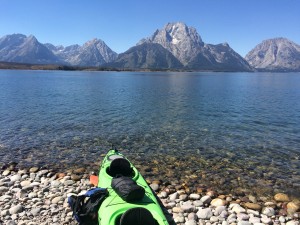
Kayaking in the Tetons
Every once in awhile my “aloneness” in the world hits me. Okay, so I’ll be honest—it’s not every once in awhile; it’s pretty much every other day.
The last hit occurred when I was on assignment in the Grand Tetons, working my way through a three-day kayaking, rafting, and camping trip on Jackson Lake and then the Snake River. Joining me on this journey were two couples—one fairly young and recently wed, transplants to the west who had moved from Chicago; the other was a couple in their 70s from West Virginia who had shared a long and adventurous life together.
As we were unloading our camping gear that last night of the trip to set up camp on a desolate but beautiful peninsula beneath the gray shadow of Mt. Moran, I happened to notice the male half of the young couple carrying the bulk of his and his new bride’s gear up from the bouldered beach to a camp site at the edge of the woods. When he was finished, pitying me a little apparently, as I hoisted a heavy dry bag onto my back and then prepared to follow it with a sleeping pad on my head, he came to my aid without speaking, taking the heaviest items from me.
I was astounded. Most of the time, I can’t even entice a man to help me get a large suitcase out of the overhead compartment on an airplane even when wearing a wrist brace, trying to hang onto a small child, and obviously struggling. Yet this young man helped me without being asked and obviously with no expectation of the reward he might receive for carrying out such labor for his young wife.
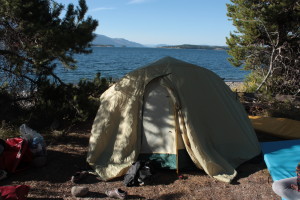
Camping on Spaulding Bay
After thanking him profusely, I began to set up my tent for the evening. I wasn’t struggling really. The task was relatively easy, just a bit awkward for two hands as opposed to four. The 70-year-old gentlemen camped near me soon came over to help and even directed me as if I was a an untried Girl Scout, which was fine. It was rather sweet actually. When he was done, he returned to his own campsite to exchange relaxing foot rubs with his wife—a phenomenon rarely seen among newlyweds much less among partners who have lived together for decades.
Once my campsite was in order, I settled down to rest behind the tent, staring off into the now glass-smooth surface of the lake, granite mountains with glaciers tucked into their crevices facing me across Spaulding Bay.
And I began to feel the aching absence I have known so much of my life.
“What is it like to have someone carry your bags for you?”
My women friends are all married, the smallest handful happily, a few miserably, and most of them in a stalemate of resigned acceptance. So far as I have seen, however, their husbands all carry their bags. Some may groan and gripe over the task, but they do it, dutifully, sometimes robotically, but sure enough, the bags end up properly placed in the trunk, in the overhead compartment, locked safely away from bears in a steel box, whatever.
I watch from the sidelines, envious at times….
You see, I have rarely had a man carry my bags. Even when I was married, my husband was in the U.S. Navy and more away from me than near, so I lived the life of a single woman, seeing him on occasional weekends or sometimes not at all for months on end.

Wandering the Malecon in Guayaquil, Ecuador
I carried my own bags, mowed my own grass, fixed my own fence, and repaired my own plumbing. I flattened myself into narrow, dirty crawlspaces to troubleshoot furnace issues, test drove and purchased my own cars, carried heavy children in my arms through amusement parks, and found my way alone through foreign airports in strange cities.
I was (and am) the mistress of self-sufficiency…just as my parents intended me to be. All my life they prepared me for a cruel world where I should “trust no one.”
Under this hardline, Scandinavian tutelage, I grew into a woman who could pretty much do anything necessary to handle the basics (and the mishaps) of everyday living. I taught single girlfriends how to change rusty and clogged water filters, repaired my own crotchety lawn equipment, and figured out how to grease stubborn, tight windows so I could close and open them with ease.
I’ve had no need for a man in my life. I am my immensely practical builder father’s daughter….
This last week, however, my seven-year-old daughter has been working on a curious project at school involving trust and team building. I can recall, in school and college, how I dreaded group projects because I knew I would not only always be the lead, but I would also always be the one carrying the bulk of the workload. I trusted, generally with reason, no one.
But Heidi’s project encouraged these things called trust and teamwork. Her class spent a morning at her teacher’s farm, learning to trust one another—closing their eyes and falling off picnic tables with the solid belief classmates would catch them.
And I could not stifle the doubtful Midwesterner in me who wondered, “Should Heidi be learning this? Won’t it harm her in the long run to believe others will be there for her? Besides me, of course? Would it not be better to prepare her, as I have long tried, for solid self-sufficiency?”
For I have, perhaps even more doggedly than my parents before me, adopted a hard line with my daughter, refusing to carry her luggage in airports, encouraging her to find bravery within her soul, nurturing her fearlessness—all in preparation for the day when she will have no mommy to carry her bags, wipe her tears, hold her close in the dark hours of the night when the whole world seems stacked against her.
It is no cruelty on my part. It is an act of love.
I don’t want tears welling in her eyes when she watches a man carry his wife’s luggage, kiss away her tears, or hold her when tragedy strikes. I want her to know she can carry her own burdens and survive.
As I have carried mine…across two decades, across four continents.
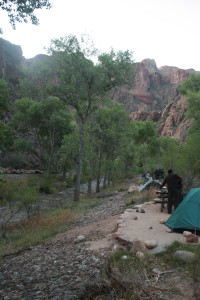
Camping at the base of the Grand Canyon along Bright Angel Creek
People often ask me why I take these journeys—backcountry treks into the Tetons, the Grand Canyon, the Smokies. Less than prudent rambles through dicey South American cities, into dusty and hardscrabble Mexican towns, into sad shops populated more by stray dogs than people in Puerto Rico.
It is partly about character building but mostly about facing fear and uncertainty. Walking through it…alone…and knowing I can do it and come out the other side. And sure, life should be about more than survival and fear facing, but those are two things you must conquer first…before you can conquer anything else.
Would that I did not have to conquer these things alone.
But there is ample reason for why I carry my own bags. It is not just my upbringing. It is not just my independent nature. Part of it is an unwillingness to settle for just any Sherpa.
I want someone who will lie on his back in the woods and name the stars for me, who will race me in his kayak across Glacier Bay and laugh and paddle backwards as icebergs crash into water. Such men are few and far between…. Men of my age have been too burned by the demands of young and foolish women, and most have retreated into a safe sort of nothingness far removed from the rambling of Grizzly bears in the woods and the pressing crowds of St. Petersburg in summer.
They do not seek the land of the midnight sun.
So instead of settling, I carry my own bags, bear my own baggage, and venture into the wilds of life alone, choosing experience over safety, and hardship (at times) over comfort. Because this is life, lived only once, with or without love, with or without someone to carry my bags, with or without the safety of someone’s arms to collapse into in the darkest hours of the night…but never without living and never without the sometimes hard to summon courage that drives one steadily to an existence without the base ugliness of regret.
I may die holding the baggage of my life in two arthritic hands, but I will not die without knowing I have lived.
Posted by Deborah Huso on Aug 20, 2015 in
Fathers and Daughters,
Musings,
Travel Archives 
The beginning of the Bright Angel Trail
When I hiked to the base of the Grand Canyon and back up to the South Rim in April at age 39, it wasn’t supposed to be about me. It was about my dad, recently turned 74, and his lifelong dream to descend to the Colorado River and back up again before he died…and while he was still physically able to do it. Against my mother’s protests, I took it upon myself to make sure he got his wish.
While my mother remained convinced the 20+ mile arduous overnight hike would set off the heart attack that would finally kill him, my whole attitude was “well, damn it, let him die happy.”
Don’t think me callous. I adore my dad, always have. He has been the sole, relentless, indefatigable cheerleader of every outrageous and stupid life plan I’ve ever had. And I have always believed he deserved better than to end his life suffering in a hospital bed.
Live large, die large. That is what he taught me.
However, if you’ve never entered a landscape (figurative, literal, or both) that has brought you in the closest possible proximity to the depth of your weaknesses and the heights of your strengths, you might find this entire blog post a little hard to grasp….

The strange lushness of Indian Garden
Here’s the thing: I started that two-day trek to the canyon’s base and up again about 9 a.m. on a cold spring morning, exhilarated and a little bit hesitant. Had I trained enough? I knew I could do a two- dozen-mile hike but with a pack weighing over 30 pounds while descending and then ascending over 4,400 feet? Carrying all my stuff and a good chunk of Dad’s? In an environment that I knew would range from close to freezing to possibly into the 90s in the span of a single day?
Dad and I spent the first six or seven miles walking together. By late afternoon, I was well ahead (but within sight distance of him), nursing screaming knees from hours and hours of relentless downhill, creeping down the unforgiving red rock of Devil’s Corkscrew, tears forming in my eyes, first from the pain in my knees…then from the pain in my heart.

Devil’s Corkscrew
Because this wonder of the world landscape doesn’t just pull at your heartstrings; it rips them. Rips them till you’re stuck in your own head, limping down a steep trail, your eyes riveted by the ever shifting rugged and unforgiving beauty of the surrounding canyon walls, the sheer marvel of a tree and grass laden oasis bisected by a cool stream, rock formations squatting like compressed biscuits cradling Indian Creek, then the vista opening again to views of miles and miles across rusty red mountains with cascading waterfalls, sun-catching desert blooms, and the promise of a first look at the mighty Colorado River that helped shape this canyon over the course of millennia.
You just have to see it.
Like life.
You have to see it, live it, endure it.
And by the time I’d finally traversed Devil’s Corkscrew onto relatively flat ground, given half my water to an idiot, dehydrated hiker who thought she could go rim-to-rim in a single day with no food and one water bottle, I was deep inside my head, at least a quarter mile ahead of Dad, my brain marauding into the no man’s land of life’s relentless disappointments, lost loves, unwillingly discarded dreams, and then those brief and fleeting moments of joy.
I had laughed when park rangers said this hike would change me.
They knew their shit.
It did.
Because there were points along the hike, my clothes soaked with sweat, hiking shoes disintegrating at the seams, and filling my toes with dry sand, that I wondered why I had thought this was a good idea. Wouldn’t I rather, especially when in the midst of that final four-mile push up a near vertical trail at the end of day two, be nursing a Manhattan while watching Mad Men?
And damn it, yes, I would!
But then I remembered the oft-repeated words of friend and fellow contributor Susannah Herrada, who says, “life isn’t supposed to be fun,” and “true love does not exist without sacrifice.”

Desert blooms at the top of Devil’s Corkscrew
Before you go and get all bummed out, think for a moment how much of human grief, particularly in Western culture, comes from the misguided belief that life is about the pursuit of happiness, that love is supposed to bring us happily ever after and eternal joy.
I didn’t initiate this Grand Canyon hike hoping for fun or for joy. I initiated it to make my father’s life richer…and my own as well.
It was, like so many things I have done, part of my relentless effort to say “yes” as much as possible. And to try to inspire others to do the same. Plenty of my life’s “yeses” have resulted in suffering, anxiety, fear…but also in walking through pain, surviving panic, and facing terror head-on.
Rest assured, I do not believe that what doesn’t kill you makes you stronger; in fact, it can often make you weaker—less prone to take future risks, less likely to give in to vulnerability, less inclined to sacrifice for love.
There were many instances on that hike that I would have liked to just quit. But, as all the T-shirts in the Grand Canyon gift shops say, “going in is optional; coming out isn’t.”
So really the only decision you have to make in this life is “yes, I’ll go in.” And that’s the decision over which so many of us (myself included) waver.
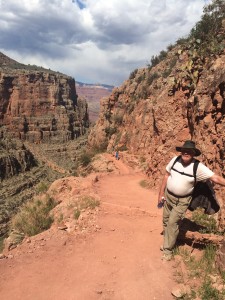
Dad taking a break on our final ascent up the canyon
I remember as the sun approached its setting when Dad and I made our final ascent on day two to the top of the South Rim, 24 miles of hiking behind us, tired to the bone and thinking of nothing but hot showers and sleep in real beds, I definitely said to myself, “Well, I’m glad I did it, but I’ll never do that again.”
But the fact is, four months later, when I returned to the Grand Canyon, this time on the North Rim, with my seven-year-old daughter, and stood with hundreds of other tourists looking down from Bright Angel Point to the squarish cliff behind which the interpretive sign told us was Bright Angel Campground (where Dad and I had pitched a tent just north of the Colorado River), I regretted I was standing there, nothing more than an observer of a vast landscape. An observer, not a doer.
And suddenly, my mind was filled with ideas of heading down into the depths of that brutal and marvelous landscape again, for days, to wander the trails not yet taken, to see all the places one can only see on foot, with courage, with endurance, with a willingness not necessarily to find happiness, or joy…but grace.
Tags: #BrightAngel, #GrandCanyon, #writewellmedia
Posted by Deborah Huso on Nov 13, 2014 in
Travel Archives Originally published November 15, 2013.

Gelato in Venice on Thanksgiving: I’m in heaven…at least as long as my pants still button in the morning….
A friend of mine whose had some pretty sad experiences over the holidays, ranging from ending her marriage one year to losing her mother to cancer another, told me recently she was making her home into a “holiday-free zone.” “No turkeys, Christmas trees, or mistletoe are getting into this house,” she proclaimed.
I regret to say I fully understand. I haven’t exactly had the best run on Thanksgiving/Christmas seasons myself. Long married to a man who eschewed much celebration of Christmas because it reminded him too much of being tugged back and forth between divorced parents as a child and having long been a member of a dysfunctional family extraordinaire (i.e. relatives who can sit at the same dinner table for an hour or more and never make eye contact much less speak), the holidays often seem to me more like something to “get through” than to enjoy.
The last couple of years I’ve found creative ways to escape the holidays. I spent Thanksgiving 2011 in Venice, Italy, where there was not a sign anywhere that Americans across the Atlantic were gathering around extended dining room tables carving succulent birds and spooning cranberries onto the fine china that’s pulled out only twice a year. And Christmas 2012, I was so desperate to escape family drama, I opted for taking my daughter to Disney World as an excuse for not showing up to the holiday dinner table.
So far my daughter hasn’t minded…or at least hasn’t noticed. But I wonder sometimes if that’s because she just hasn’t had much experience with the Norman Rockwell version of Christmas. And honestly, do any of us? At least since passing the age of 12 when we started to notice that maybe our aunts and uncles really weren’t that fond of one another and that Grandma so-and-so hadn’t spoken to her son’s wife in five years?
Another friend has troubles at Christmas because her mother can’t bear to be in the same room with her father. They are divorced but can’t make nice even for a day. And honestly, why should they have to? How is it the holidays have become this obligatory family-free-for-all, where if the relatives aren’t engaging in shouting matches over some 20-year-old spat, they are at least sitting there sullenly wishing they were home instead watching football or reading a good book?
I have some acquaintances who hold what they term “a dysfunctional Thanksgiving.” It’s a gathering of friends, not family, over a prodigious feast and is open to anyone who would rather be there than at a family dinner table. Not surprisingly, it draws quite a crowd.

Christmas at Disney World
I haven’t decided yet how I’m going to establish my own version of a “holiday-free zone” this year. Granted I’ve already started putting up a few Christmas wreaths here and there (though I’m truly debating whether or not to drag the 9 ft. tall artificial fir tree out of the basement and spend 6 hours decorating it while stepping precariously from step ladder to step ladder).
I might just send my daughter off to spend Thanksgiving with her father’s dysfunctional family and curl up in front of the fire with a cup of hot cocoa and a good book. As for Christmas, I found myself eyeing some winter trips to Austria and Germany that, as luck would have it, fall right over December 25.
And in an effort to avoid the over-the-top Christmas cheer already showing up in shopping malls and department stores, I think I’ve figured out a way to order all my gifts online and have them delivered to my doorstep…or someone else’s. Heck, with any luck, I might even be able to avoid wrapping paper, ribbons, and Scotch tape.
Though to be quite honest, it’s not the decorations that get to me so much or even the hours and hours of gift wrapping. It’s the childhood memories of traditions that will never be again that often make my Christmas blue.
I know my grandmother, who now lives in a nursing home and is suffering from Alzheimer’s, will no longer oversee my creation of Lemon Cloud. Nor will I ever watch her and my mother roll out dough for flatbread and lefse anymore. Dad and I will never sit together competing over who can make the most elaborate bow to plunk on a gift, and I’ll never climb into bed with my giggling cousins and store contraband soda pop in frosted bedroom windows for midnight snack.
And in the midst of all that loss, I struggle with how to shape the holidays for my daughter, wondering if I would even be doing her any favors by trying to recreate the holidays I thought I knew as a child, holidays where my parents and grandparents may have felt just as displaced as I do now.
Perhaps, in the end, it’s better to scoop her off on a Christmas Caribbean vacation or to spend Thanksgiving reading books in front of the fire. These are traditions that can keep going and going, that don’t require loads of extended family, that don’t rely on rituals that will die when the grandparents die, and where the holiday décor and baking isn’t associated with a sense of loss.
Because I don’t want Heidi feeling one day, as I do now, that January 2 cannot get here fast enough. No, I want her to feel confident in celebrating the joys of the season without the guilt-ridden obligations of family or the sense that her life is somehow inadequate if it doesn’t include a spouse, two kids, and a dog.
Posted by Deborah Huso on Oct 16, 2014 in
Travel Archives 
Tootsie’s Orchid Lounge in Nashville
Originally published December 8, 2011.
Being a good seven years removed from the dating scene, I am perhaps not the woman most suited to commenting on how men communicate with women. After all, once you are married, you’re lucky if you get a couple of grunts of affirmation at the dinner table or a passing glance if you walk through the living room with no clothes on. It’s not a lot to go on for figuring out what the man in your life is thinking…though he will claim, if asked directly, that he’s thinking nothing at all.
But that’s doubtful. While the figure has been thrown out there that men think about sex an average of every seven seconds, recent research has shown that’s just urban myth. Men only think about sex an average of 19 times per day. The rest of the time they’re thinking about food and sleep (but sex still tops the list).
So perhaps it’s true men are simpler creatures than we are when it comes to what’s going on with the gray matter, but still, do you ever wonder just what the heck they want? Because if it’s just to get between the sheets, they have an often complicated (and sometimes downright stupid) way of going about it.
A couple of recent trips seem to prove my point because there is nothing to put a woman in the crosshairs of male notice faster than traveling sans male escort. One gets winked at by waiters, kissed by cowboys, and cat called by British subjects at train stations. Is all of this some form of expressing a desire to take a roll in the hay, or is it just a ploy for bigger tips?
If you know, please weigh in…because I’m still trying to figure it out. And sometimes even more intriguing than trying to determine just what it is the guys are after is trying to figure out what it is they don’t understand about the very blunt art of female extrication.
Here’s a case in point: While a girlfriend and I were traveling in Venice, we experienced a fair share of “Mama Mia!” and “Hey baby!” while walking the streets after dark, but it was not until we sat down to enjoy some live music and gelato at a restaurant in St. Mark’s Square that things became really interesting. Just as we were about to leave, an overly jovial middle-aged Italian male came out of nowhere, and he and his more sober companion began begging us to stay for drinks. We politely declined and began gathering our coats.
“No, no, stay!” he says in remarkably good English.
“I’m married,” my friend says quickly.
“Me, too!” exclaims the accosting Italian as if he has just discovered, with delight, that the both of them play golf.
“I have to go,” she says. “I need to call my husband.”
“Let me call him for you!” he bellows undeterred, and then he grabs her around the shoulders, plants a kiss on her cheek, and my friend begins a disentanglement attempt that looks shockingly like Penelope Pussycat trying to escape the embrace of Pepé Le Pew.
“Check, please!” I cry to the waiter, slapping down a handful of Euros, grabbing my friend by the hand, and hurrying out into the streets, where we begin a brisk walk to the water taxi that will take us, along with a wide array of drunken consorts, back to our accommodations. As an American college student heaves over the side of the boat, my friend turns to me and says, “What was that all about? Did he really think that kind of aggressive behavior was attractive?”
I shake my head, “He was drunk.”
But that still doesn’t answer the question of what the man wanted ultimately—a drink with a pretty young American? A one-night stand? A few minutes of Tom-foolery? A shot in the arm of his deflated middle-aged ego?

Susannah makes a Texas oil man’s night
Some men are more subtle and, in some ways, even more difficult to decipher. While in one of Nashville’s honky tonks on assignment last week, I had no qualms about dancing with anyone who asked. After all, I love to two-step, and my husband is tone-deaf, has two left feet, and wouldn’t be caught on the dance floor if his life depended on it. A woman does what she has to do.
An older gentleman in a beige Stetson and camel-colored leather jacket approached me gallantly toward the end of the evening and said, “My dear, would you do me the honor of dancing with me? I have to go home to Oregon tomorrow, and it would make my night if you would dance with me.”
Well, that’s almost like making a last request before final unction, so, of course, I agreed. But I wasn’t in his arms more than a few seconds before he pulled me as close as if I was his dearest love and had been for years and years. There was no graceful extrication from this tight embrace, so I endured it, grateful there was no rousing in the gentleman’s nether regions, and let myself be twirled around the dance floor for the length of a gratefully short song.
When it was over, he hugged me close, kissed me hard on the cheek, took both my hands in his and thanked me profusely. Then away he went.
What was that?
And what did it mean when the tall and handsome cowboy from the Netherlands who stood near me and chatted on multiple different occasions only inches from the dance floor declined to ask me to dance? And then when I finally asked him if Dutch boys didn’t dance, he grudgingly obliged me on the dance floor with an anxious grin as I made a vain attempt to teach him the two-step. When it was all over, he gave me the obligatory “cowboy kiss” and never danced again with anyone the rest of the night, myself included. It was obvious dancing was not his forté, but did he really think there was any chance of picking up a girl in a Nashville honky tonk while standing on the sidelines with a beer?
All of this leads me to the question not just of what do men want (even though researchers claim it’s mainly sex, food, and sleep) to do they even know how to get it? And I’m afraid, ladies, the answer is a resounding “no.” They have not the slightest clue and are willing to stare opportunity smack in the face and screw it up or turn it down, leaving women struggling to understand.
Because we will struggle. Unlike men, we won’t walk away and shrug and figure it was never meant to be. No, as my oldest friend pointed out to me last night as we sat awake talking, “We decide to punish them for their infractions by not returning their calls or e-mails, and they think nothing of it. We lie awake stewing while they sleep peacefully and clueless.”
And then when we break up with them, they are surprised. They have no idea anything was wrong, oblivious to the mixed messages they have been sending—their expressions of desire and then their pulling back from it—intent only, apparently, on what’s for dinner, when they get to sleep, and whether or not they’ll get sex the next day.
And we envy their simple-mindedness at first, wishing we ourselves could be satisfied with so little. Until we remember, of course, how tragic it would be to stand on the sidelines of life with a beer for company, to never dance again, as many times as we possibly can, to every song the band is willing to play, before the dance hall closes for good.
Posted by Claire Vath on Sep 25, 2014 in
Musings,
Travel Archives Long ago, my husband and I learned that a good way to survive a long road trip is to consume large portions of the time with audio books, and some of our favorites are by David Sedaris. If you haven’t read him, you should.
He’s a writer, playwright, brother of Amy Sedaris, “This American Life” commentator, and frequent guest on Letterman. Up until now, all his books have been memoirs about the oddities of his life and familial nuances.
And right before one of his last books was published, we got the opportunity to see him. I did my research beforehand and read an article saying that he was looking for filthy jokes on this particular book tour—“the filthier the better,” he was quoted as saying.
I pride myself on being an excellent researcher/master Googler. So playing the good journalist, I scoured the Internet for some jokes worthy of David Sedaris. I found two—one incredibly raunchy, the other one just kind of. I scrawled them on slips of paper and folded them up. My husband made it clear that I was not to give them to David Sedaris, but then, I hadn’t even told him what was on the paper.
We got to the book signing and were seventh in line. When the first person went up to meet him, David informed the guy he was collecting jokes and asked the guy for some. The guy fumbled for words, clearly thrown off by the request.
“See?” I turned, triumphantly, to my husband. “I told you! I’m giving him these jokes. Do you want one of mine?” I offered.
“No,” he said flatly.
When we got to the front of the line, David Sedaris, in his high-pitched, lispy voice asked if we had any jokes.
“I heard you were looking for jokes,” I said, “and so I brought you a few.” I handed him the slips of paper, and was rewarded with his signature gap-toothed smile.
“How’d you hear that?”
“I did my research,” I said.
And then, David Sedaris, one of my most favorite authors, unfolded my slips of paper and roared with laughter.
“This is one of the filthiest jokes I’ve seen,” he said.
I blushed furiously. “I know.”
And then he read it out loud. I’m glad he did because I don’t think I could have. And my husband, who had not seen the jokes, looked at me incredulously. At this point, I think my face was as red as the sweater I was wearing.
So I did what any self-respecting woman would do: I put my hands on my protruding stomach and said, “I’m going to be someone’s mother soon!”
Here’s the dirty joke (thanks, Internet! Sorry, Mom!):
Question: Why are women like Kentucky Fried Chicken?
Answer: After you’ve finished with the thigh and breasts, all you have left is a greasy box to put your bone in.
The inscription in my copy of Squirrel Seeks Chipmunk reads: “Thanks for that filthy joke. David Sedaris.”
“And years from now, when our child reads that, he’s going to ask what the filthy joke is,” my husband remarked.
David Sedaris laughed again and then proceeded to pull out a little green notebook—his personal joke book—and read us five or six jokes. He was every bit as droll as I’d hoped.
And then he, the great David Sedaris, inscribed a book to my husband, the proud—if not, at this point, a bit scandalized—father of the baby (now-3-year-old child) I was carrying at the time. The baby who, one day, will perhaps flip open a David Sedaris book and ask his mother what this unspeakable joke was…though if he is anything like his father, he will probably prefer not to know….
Posted by Deborah Huso on Jul 28, 2014 in
Musings,
Success Guide,
Travel Archives This special post is part of a writer’s blog tour in which I was invited to participate by friend and fellow author Erin Casey. Check out why she writes, and then be sure to check out the blogs of a few other of my favorite bloggers at the end of this post!
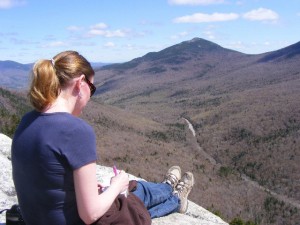
The author in her “summer office”
More than a decade ago, when I was just beginning to launch my career as a full-time freelance writer, I remember driving through Goshen Pass in western Virginia, pulling off the road periodically to frame scarlet sugar maples and golden poplars in my camera lens for a fall getaway article I was writing. Still giddy at the idea I was actually pursuing this crazy dream of mine to live by the written word, I turned to my travel companion, a friend who had accompanied me on so many of these writing journeys, and said, “You know what? I’m a writer. I’m actually a writer.”
He regarded me with understandable puzzlement and said, “Well, of course, you’re a writer.”
“No, really,” I insisted, as if daylight had suddenly shattered through the sodden tree limbs overhanging Route 42, “I’m a writer. I’m actually making a living by writing.”
Of course, this was not news to my friend. But somehow it was news to me. Through late nights at the computer and endless prospecting for freelance work, I had somehow been so caught up in the business of making a living by my craft that I had failed to notice the point at which I actually became a professional writer.
But then the question remains, what exactly is a writer? And have I, for the past 30 years, been selling myself short because I was not, for nearly 20 of those years, earning a living wage as a writer? How many writers, after all, can earn a consistent living wage by their craft? After all, it took me two decades to figure it out.
You see, I was not suddenly a writer while photographing autumn foliage in Goshen Pass. Nor was I suddenly a writer when I published my first newspaper article or my first short story. If we want to talk about writing and what it means to be a writer, well then, I have to go back much farther, to a period that doesn’t appear on my resume. Because I have been a writer almost since I could hold a pen, quite literally.
I wrote my first short story when I was six years old. I was no child prodigy. I had been reading biographies of famous Americans written for young children and had loved them so much I wanted to write my own. So I wrote a story (though I probably considered the effort great enough at the time to be called a book) about a pioneer girl named Ellen Kay Brown. And I illustrated it, too, with pencil sketches of girls in bonnets and fathers with grisly beards.
I handed the notebook-paper story to my mother, a high school English teacher, for my first critical review. She didn’t paste it to the refrigerator with a magnet or smile and exclaim how proud she was of my effort. She took it in her hands quite seriously, as she would a research paper on Hamletor Macbeth, and, red pen in hand, proceeded to critique my first attempt at literature, circling my childish “enuff” and changing it to “enough,” capitalizing proper nouns, inserting punctuation.
Was this some cruelty on her part? I never for once thought so, but perhaps some more indulging parent might. This was par for the course in a household where books lined shelves in rooms upstairs and down and where anyone of blood relation would know the difference between “can” and “may” as well as “lie” and “lay.”
I took my little manuscript back, absorbing her red corrections, recording their sense for the next effort, and thus began a ritual between us that lasted until I left home for college. I wrote; she critiqued quietly with her red pen. By the time I graduated from high school, I was one of only a select few in the world who knew, as if by second nature, when and when not to use commas as well as how to give stylistic flair to an exam essay (though my mother claims no responsibility for the latter skill).
Today my mother keeps all these carefully reviewed manuscripts—penciled short stories, illustrated poems, carefully typed essays—in a cabinet in the library. They are small treasures to her, the woman who said, when I declared at six years of age that I was going to be a writer, “It’s never wise to count your chickens before they hatch.”
But I’ve always been counting chickens, hatched and unhatched, and I’ve never assumed anything other than success. That has been my way. It would have to be my way. Only a dreamer could ever believe it possible to make a career out of language.
But still the question—when did I become a writer? My first sense that I might be one actually came when I was a senior in college and my mentor and three-time history professor said upon reading my senior thesis, “There’s nothing I can tell you about writing. I wouldn’t know how to critique you.” My mother never said this, but on the infrequent occasions when I showed her a college or graduate research paper, she would read it, first page to last, hand it back, and say only, “Looks fine to me.” Flipping through the paper, I scanned the pages for the familiar red ink—nothing. Full circle at last, I thought.
Yet no writer who is a good writer ever thinks his or her work is good enough. I read articles I wrote only months ago and think today they look horrible. I have become my mother minus the red pen. All things can be improved upon.
Yet all writers know this, and all writers know, deep down, that it is not so much the paycheck that justifies them as authors. It is the constant development, the constant effort. I have been a writer since I was six. An editor might be intrigued to know that I have more than three decades of experience. But would that intrigue persist if she knew the whole truth?
Probably not.
And that is the sad reality of the writing life. Until you have a paycheck from a publisher, and preferably several, you are not a writer. Your skill level, your decades of practice, your passion are irrelevant . . . at least to most editors.
Did you ever notice that the editor who constantly sent you rejections of your pitches suddenly changed his tune when one of his colleagues took a chance and published your work . . . with success? Yes, once you have a few publishing credits behind you, the rejections trickle to a minimum. Which makes you wonder—does good writing count for anything? Or are editors, like movie producers, tied to the tried and true?
Well, yes and no. Good writing does count for something. After all, it’s easier to publish good writing than bad. But getting good writing noticed, in the end, is a matter of luck. For myself, I ran into an overwhelmed newspaper editor willing to take a chance on me and the editor of a start-up lifestyle magazine with a dearth of authors. After that, everything began to fall into place. Just ask Nicholas Sparks how he became a best-selling author overnight. His answer, like that of so many other wildly successful writers, will make you dream like the daily players of the lottery and gnash your teeth at the same time.
It is luck.
But it’s also persistence. Beat the statistics by flooding the market.
I guess my mother, my original editor, knew a thing or two. I kept passing her the notebook paper, and one day it came back without red ink. Was it talent, or did I beat the odds? Perhaps a little of both . . . but maybe it’s time I started playing the lottery.
Check out some more writer’s blogs on this tour. Below are three of my favorite writer ladies!
 Susannah Herrada is an aspiring “Lady who Lunches” who spends most days trying to figure out how to avoid the mundane inherent in her role as ‘homemaker’ by preparing for or unpacking from an adventure. Spending about a quarter of her life on the road these past few years, she’s anything but a ‘stay at home mom.’ For summer 2013, she’s on her third extended summer trip, this time to Central America, two kids in tow.
Susannah Herrada is an aspiring “Lady who Lunches” who spends most days trying to figure out how to avoid the mundane inherent in her role as ‘homemaker’ by preparing for or unpacking from an adventure. Spending about a quarter of her life on the road these past few years, she’s anything but a ‘stay at home mom.’ For summer 2013, she’s on her third extended summer trip, this time to Central America, two kids in tow.
Check out her wanderings at Not At Home Mom. After each trip, she finds herself back in the Washington D.C. metro area with a new perspective on life, love, parenting, politics, and what really matters.
Before Susannah turned her sights to the open road (and writing about it), she taught eighth grade physical science in Arlington, Virginia.
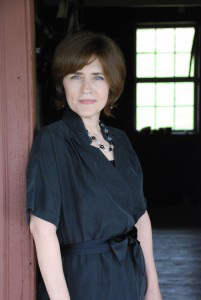 Mollie Cox Bryan is a journalist and cookbook author turned novelist. After 20 years of writing nonfiction for nonprofits, corporations, museums, magazines like Grit, Taste of the South, and NPR’s Kitchen Window, and cookbooks, she turned to mystery. Scrapbook of Secrets: A Cumberland Creek Mystery (Kensington, 2012) was her first mystery novel and was an Agatha Award finalist for best first novel in 2012. Her second in this five-book series,Scrapped (Kensington, 2013), is a finalist for the Library of Virginia’s People’s Choice Literary Award.
Mollie Cox Bryan is a journalist and cookbook author turned novelist. After 20 years of writing nonfiction for nonprofits, corporations, museums, magazines like Grit, Taste of the South, and NPR’s Kitchen Window, and cookbooks, she turned to mystery. Scrapbook of Secrets: A Cumberland Creek Mystery (Kensington, 2012) was her first mystery novel and was an Agatha Award finalist for best first novel in 2012. Her second in this five-book series,Scrapped (Kensington, 2013), is a finalist for the Library of Virginia’s People’s Choice Literary Award.
The mother of two active daughters, Mollie lives in Waynesboro, Va., where her traveling consists of carting the girls back and forth to music and dance classes, the library, and shopping malls. Visit Mollie’s blog about the writing life.
Jill Smokler is New York Times bestselling author of Confessions of a Scary Mommy (Simon and Schuster, 2012) and Motherhood Comes Naturally (And Other Vicious Lies) (Simon and Schuster, 2013). She runs The Scary Mommy web site, an online confessional of sorts about motherhood and oversees Scary Mommy Nation, a 501(c)3 organization devoted to helping Moms in a really scary situation–the inability to feed their families.
Check out the Scary Mommy blog!
Posted by Deborah Huso on Jul 8, 2014 in
Motherhood,
Musings,
Relationships,
Travel Archives Being a writer, I travel a lot, often averaging a week away from home a month. I don’t complain about it too much though. In fact, I’ll let you in on a secret: I love it. It doesn’t matter that I’m working. Because let’s face it: while my days “on assignment” can be long and tiring, sometimes starting at 6:30 a.m. and not ending until 10 p.m. (and let’s not forget the couple of hours I then stay up catching up on e-mail at the hotel), they are not usually spent in arduous meetings watching the dullest PowerPoint presentations known to man. Instead, I will frequently spend these days away from home doing everything from sea kayaking to stand-up paddle boarding. It could be worse. It could be a lot worse.

The author, sans famille, in the Sea of Cortez
And even if it were a lot worse, I still wouldn’t complain. A friend of mine who travels around the world overseeing clinical research trials says she loves hotel rooms. “When you leave them in the morning and come back in the evening, they look pretty much the way they did when you checked in,” she says. “Someone makes the bed, cleans the bathroom, leaves you cookies.”
An editor, wife, and new mother I ran into on my latest trip to Chattanooga, Tennessee, told me she, too, loves the travel that comes with the job: “I get a king bed all to myself, and I don’t wake up with any cats sleeping on my head.” An added bonus: she can drink beer at the airport.
Unfortunately, I know far too many women who have not yet discovered the art of traveling solo, whether it’s for work or pleasure. Guilt ties them to their husbands and children. They are so guilt-ridden, in fact, that they would never admit to their friends (or even to themselves) that they actually want to get the heck out of Dodge, even if only for a day or two. This is tragedy on a grand scale. And I cannot help but wonder why otherwise sane and intelligent women chain themselves to motherhood and marriage as if it’s a life sentence, no probation allowed.
Men rarely do this. How many men ask their wives if it’s okay to go out with the guys on the weekend or if it would be in bad form to go on a hunting trip to Alaska for a week? Do men feel this level of bondage? I don’t think so. Call it socialization if you will, but even the most liberated women among us still feel they are less than women if they long for a night away from their toddlers or a week away from the company of their spouses.
I’ll admit it took me awhile to discover the blessings of solo travel. I got my feet wet taking girlfriend getaways and discovered, at first to my horror, that vacationing with women friends was about ten times more fun than traveling with my husband. You don’t have to waste time looking beautiful every day because your girlfriends really don’t care as long as you’re not embarrassingly sloppy, and you can laugh as loud as you want in the restaurant because women are not as hung up on propriety as men are (yes, it’s true, ladies). Plus, your female friends won’t give you a guilt trip about going to a museum they’re not really interested in. Women share and share alike. Follow me around The Louvre, and I’ll support you in your search for the perfect stinky cheese. Men will tell you it’s okay with them if all you want to do is shop for shoes in Rome, but they don’t mean it. And they’ll give you more guilt than your mother when it’s all said and done.
But even better than the girlfriend getaway is the solo retreat. And I don’t care if it’s an actual vacation or travel for work. Few things beat sitting alone in a posh restaurant in a tropical garden in L.A. sipping California Riesling without having to carry a conversation or make someone else laugh. It’s divine, in fact, about as divine as sinking into a king-size bed in a hotel suite you have all to yourself with no 6 a.m. “I’ts morning time, Mommy!” wake-up calls.
When I travel by myself, whether it’s on my own personal vacation or on assignment for a magazine, I retreat (without even being aware of it sometimes) into a life that is mine but isn’t. All the anxiety of meeting deadlines, picking up the kid on time, being cheerful for a grumpy spouse coming home after 12 hours of work and a long commute, and suppressing my own “I just want to scream because I can’t take it anymore” tendencies so I don’t land my daughter in psychotherapy before age 12 dissipate into thin air. I forget that crazy woman who lives at home and become entirely myself–the long lost adventurer of my youth out on a journey to see the world and live in the moment with no responsibility to my name but getting out of bed and living hard and blissfully all day long.
If you tell me you don’t need this, then I have to tell you: you are lying to yourself, whether out of guilt or societal pressure, I don’t know. But you are lying. Because we all need to be apart from our families. We all need to stay in touch with the women that we were and still are beneath that stressed out surface of the world’s greatest multi-tasker.
I didn’t realize how much I needed it until returning from a trip one day and pausing across a long layover at O’Hare to have lunch and remembering for a moment that I was returning to my four-year-old’s birthday party–a potential mob of waist-high people in my house, the presence of my mother, my mother-in-law, and sundry relatives who all think I’m just a little bit too much to take. The thought of that re-entry into my everyday life made me scan the menu for hard liquor.
But, in the end, while I’ll never be the mother my mother thinks I should be, I’m a damn good one just the same. And that’s because my solo journeys strengthen my sanity and enable me to walk into my bedroom, where my daughter has just colored the ottoman on my favorite chair with an ink pen, and not turn into psycho-mommy. Instead, I glance over at the stack of Italy travel books on my nightstand, smile a little to myself about my next escape, and engage in a strangely rational conversation with my child about why we don’t do pen and ink drawings on household furniture.
So next time you find yourself putting on a “mommy show” for your 10-year-old, who seems mildly amused that you can get so upset over the fact that he just locked his sister in the closet (a treatment she may well have deserved if she was chattering on the way she is known to chatter on), consider the fact that it may be time for you to do some solo traveling of your own.
























 Mollie Cox Bryan is a journalist and cookbook author turned novelist. After 20 years of writing nonfiction for nonprofits, corporations, museums, magazines like Grit, Taste of the South, and NPR’s Kitchen Window, and cookbooks, she turned to mystery. Scrapbook of Secrets: A Cumberland Creek Mystery (Kensington, 2012) was her first mystery novel and was an Agatha Award finalist for best first novel in 2012. Her second in this five-book series,Scrapped (Kensington, 2013), is a finalist for the Library of Virginia’s People’s Choice Literary Award.
Mollie Cox Bryan is a journalist and cookbook author turned novelist. After 20 years of writing nonfiction for nonprofits, corporations, museums, magazines like Grit, Taste of the South, and NPR’s Kitchen Window, and cookbooks, she turned to mystery. Scrapbook of Secrets: A Cumberland Creek Mystery (Kensington, 2012) was her first mystery novel and was an Agatha Award finalist for best first novel in 2012. Her second in this five-book series,Scrapped (Kensington, 2013), is a finalist for the Library of Virginia’s People’s Choice Literary Award.